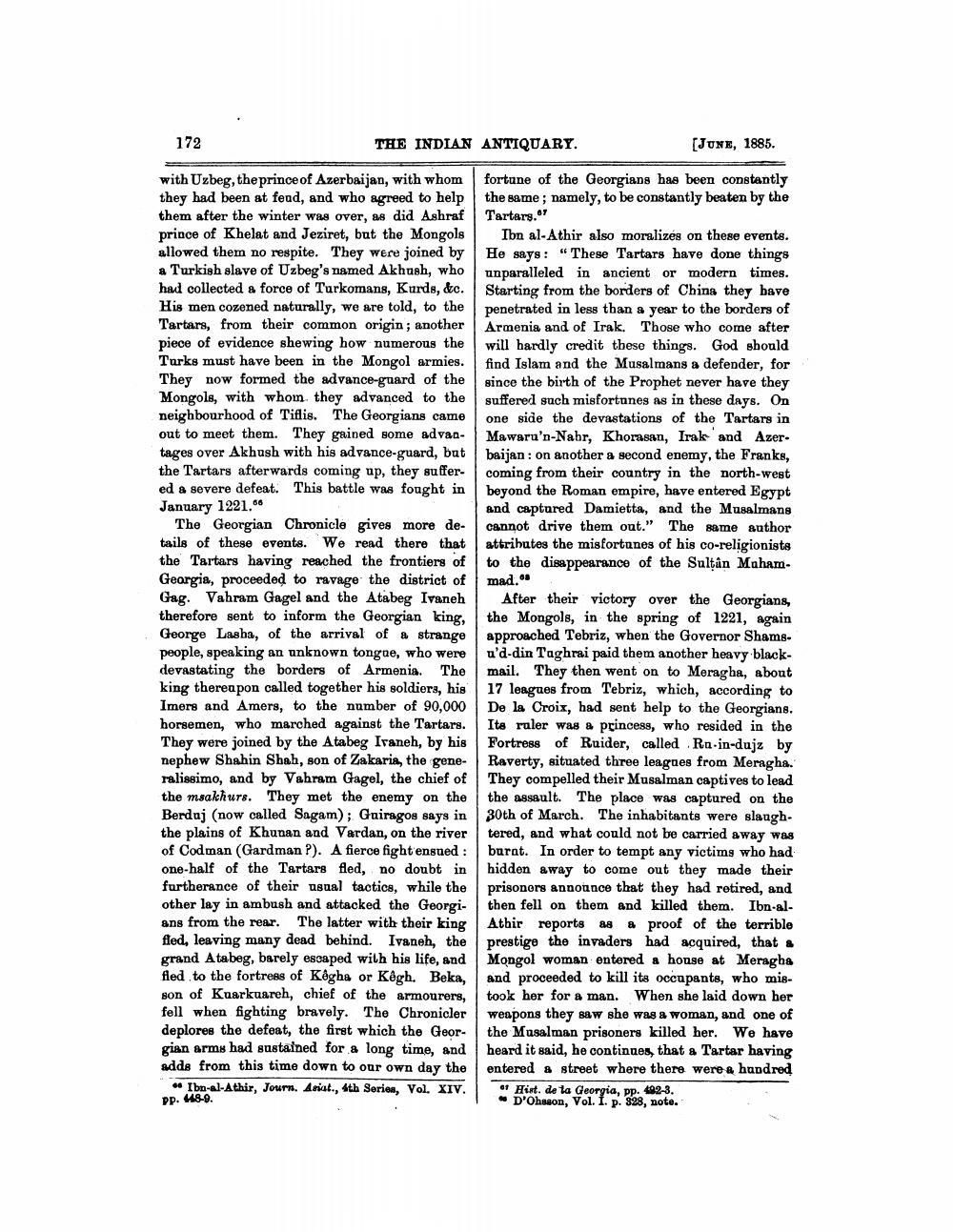________________
172
THE INDIAN ANTIQUARY.
with Uzbeg, the prince of Azerbaijan, with whom they had been at feud, and who agreed to help them after the winter was over, as did Ashraf prince of Khelat and Jeziret, but the Mongols allowed them no respite. They were joined by a Turkish slave of Uzbeg's named Akhush, who had collected a force of Turkomans, Kurds, &c. His men cozened naturally, we are told, to the Tartars, from their common origin; another piece of evidence shewing how numerous the Turks must have been in the Mongol armies. They now formed the advance-guard of the Mongols, with whom they advanced to the neighbourhood of Tiflis. The Georgians came out to meet them. They gained some advantages over Akhush with his advance-guard, but the Tartars afterwards coming up, they suffered a severe defeat. This battle was fought in January 1221.66
The Georgian Chronicle gives more details of these events. We read there that the Tartars having reached the frontiers of Georgia, proceeded to ravage the district of Gag. Vahram Gagel and the Atabeg Ivaneh therefore sent to inform the Georgian king, George Lasha, of the arrival of a strange people, speaking an unknown tongue, who were devastating the borders of Armenia. The king thereupon called together his soldiers, his Imers and Amers, to the number of 90,000 horsemen, who marched against the Tartars. They were joined by the Atabeg Ivaneh, by his nephew Shahin Shah, son of Zakaria, the generalissimo, and by Vahram Gagel, the chief of the msakhurs. They met the enemy on the Berduj (now called Sagam); Guiragos says in the plains of Khunan and Vardan, on the river of Codman (Gardman ?). A fierce fight ensued: one-half of the Tartars fled, no doubt in furtherance of their usual tactics, while the other lay in ambush and attacked the Georgians from the rear. The latter with their king fled, leaving many dead behind. Ivaneh, the grand Atabeg, barely escaped with his life, and fled to the fortress of Kêgha or Kêgh. Beka, son of Kuarkuareh, chief of the armourers, fell when fighting bravely. The Chronicler deplores the defeat, the first which the Georgian arms had sustained for a long time, and adds from this time down to our own day the
es Ibn-al-Athir, Journ. Asiat., 4th Series, Vol. XIV. PP. 448-9.
[JUNE, 1885.
fortune of the Georgians has been constantly the same; namely, to be constantly beaten by the Tartars."7
Ibn al-Athir also moralizes on these events. He says: "These Tartars have done things unparalleled in ancient or modern times. Starting from the borders of China they have penetrated in less than a year to the borders of Armenia and of Irak. Those who come after will hardly credit these things. God should find Islam and the Musalmans a defender, for since the birth of the Prophet never have they suffered such misfortunes as in these days. On one side the devastations of the Tartars in Mawaru'n-Nahr, Khorasan, Irak and Azerbaijan: on another a second enemy, the Franks, coming from their country in the north-west beyond the Roman empire, have entered Egypt and captured Damietta, and the Musalmans cannot drive them out." The same author attributes the misfortunes of his co-religionists to the disappearance of the Sultan Muhammad.""
After their victory over the Georgians, the Mongols, in the spring of 1221, again approached Tebriz, when the Governor Shamsu'd-din Taghrai paid them another heavy blackmail. They then went on to Meragha, about 17 leagues from Tebriz, which, according to De la Croix, had sent help to the Georgians. Its raler was a princess, who resided in the Fortress of Ruider, called Ru-in-dujz by Raverty, situated three leagues from Meragha. They compelled their Musalman captives to lead the assault. The place was captured on the 30th of March. The inhabitants were slaughtered, and what could not be carried away was barat. In order to tempt any victims who had hidden away to come out they made their prisoners announce that they had retired, and then fell on them and killed them. Ibn-alAthir reports as a proof of the terrible prestige the invaders had acquired, that a Mongol woman entered a house at Meragha and proceeded to kill its occupants, who mistook her for a man. When she laid down her weapons they saw she was a woman, and one of the Musalman prisoners killed her. We have heard it said, he continues, that a Tartar having entered a street where there were a hundred
Hist. de la Georgia, pp. 422-3. D'Ohsson, Vol. I. p. 328, note.




